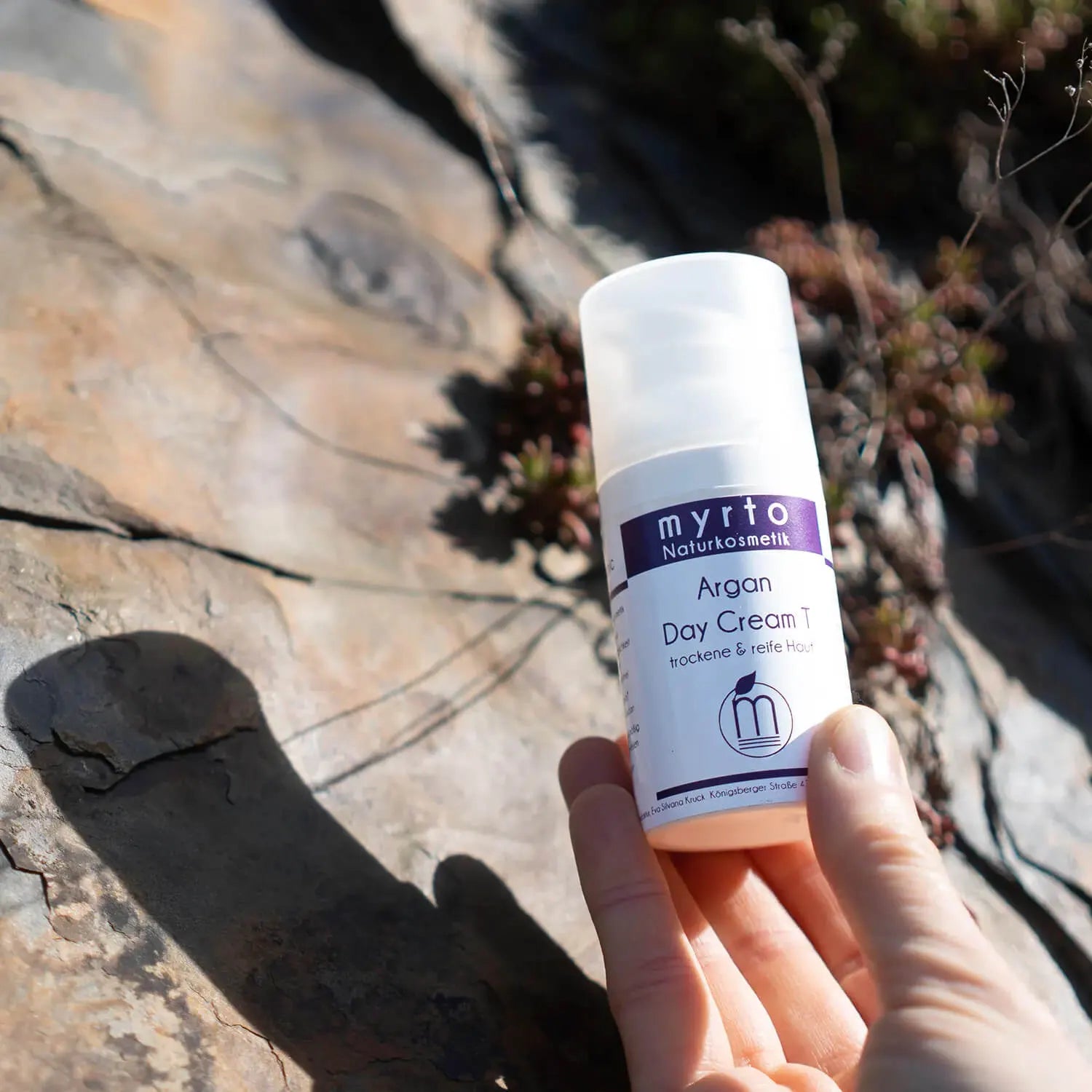
Questions about Vitamin C in Beauty Care
Vitamin C is one of the most sought-after active ingredients for facial care - and for good reasons. Vitamin C not only offers a variety of benefits for the entire organism, but also for a healthy, radiant complexion. Vitamin C also protects against the signs of premature skin aging.
Essential nutrient for health
Vitamin C is an essential micronutrient that our body cannot produce itself and therefore relies on regular intake through our diet. The chemical name ascorbic acid for this vital nutrient comes from Latin: "ascorbic" means "no scurvy".
Scurvy, a disease that was once widespread among sailors, was caused by a vitamin C deficiency that lasted for several months and was a frequent cause of death among sailors. Those affected suffered from bleeding gums, joint inflammation, increased susceptibility to infections, fatigue and skin problems with poor wound healing. After a British ship's doctor discovered in the 18th century that lemons or sauerkraut helped against scurvy, these foods became an integral part of long sea voyages.
Functions of Vitamin C in the Body
- Strengthens the immune system: Vitamin C supports the formation of various immune cells that can destroy harmful bacteria or viruses in the body.
- Promotes wound healing: Vitamin C stimulates collagen production and thus supports a strong and elastic wound scar.
- binds free radicals: Vitamin C is able to destroy aggressive reactive oxygen molecules. These are increasingly produced by environmental pollutants, UV radiation, physical or mental stress, lack of sleep or nicotine. Free radicals can damage and even destroy molecules, cells and tissue in the body.
- Promotes the absorption of iron from food: Vitamin C improves the solubility of iron in the intestine and binds substances that inhibit the absorption of iron.
- Promotes detoxification: Vitamin C activates enzymes that are responsible for breaking down toxins. This can, for example, neutralize the damaging effects of nicotine or nitrosamines in the body, i.e. toxic nitrogen-containing compounds that are considered carcinogenic.
vitamin C-rich diet
Depending on age, gender and pregnancy, it is recommended to consume between 0.2 and 1g of vitamin C per day. This important nutrient is found in abundance in lemons and other citrus fruits, for example. However, berries, especially sea buckthorn, rose hips and black currants, have a significantly higher vitamin C content. The top performers include the acerola cherry with 1.7g of vitamin C per 100g, camu camu fruit from the Amazon region with 2g per 100g and the Australian bush plum with up to 3g of vitamin C per 100g. Broccoli, kiwis, Brussels sprouts, peppers, tomatoes and parsley are also rich in vitamin C and should not be missing from your diet.
What are the benefits of vitamin C in skin care?
-
Antioxidant against premature skin aging: Vitamin C is one of the strongest antioxidants. As a radical scavenger, the vitamin neutralizes aggressive molecules, so-called free radicals. Free radicals are harmful metabolic products that steal an electron from other molecules in the skin, thereby damaging them and causing our skin to age more quickly. Polluted city air, excessive UV radiation, stress, lack of sleep, alcohol or cigarette consumption mean oxidative stress for the skin, they promote the formation of free radicals. As a result, wrinkles are more likely to form, but also irritations, skin blemishes, pimples, acne or redness. To prevent such cell and tissue damage, we need effective, skin-friendly care products with powerful antioxidants.
-
Increased collagen production: Vitamin C stimulates collagen production, which slows down after the age of 25. Collagen is a structural protein that is important for the firmness and elasticity of the skin. This helps reduce fine lines and wrinkles and improves skin firmness.
-
Anti-inflammatory effect: Vitamin C has also proven effective in the treatment of skin conditions such as rosacea or acne. With its anti-inflammatory effect, vitamin C helps to combat irritation, redness, blackheads or pimples. It promotes healing and soothes the skin.
-
Lightens pigment spots, age spots and acne scars: Vitamin C inhibits excessive melanin formation (hyperpigmentation, melasma) and can help lighten pigment spots. With regular use, annoying age spots fade. The complexion appears more even and smoother. Acne scars are also lightened.
-
healthy, radiant skin: With its light peeling effect, vitamin C gently removes dead skin cells. Vitamin C gives dull or spotty skin a healthy glow and natural luminosity: clearer skin that shines from within.
Is pure vitamin C (L-ascorbic acid) good for sensitive skin?
Pure vitamin C (INCI: L- Ascorbic Acid) is not recommended for skin care for sensitive skin. Pure ascorbic acid does produce the fastest results, but it is unstable and susceptible to oxidation. It requires a very acidic pH value of around 3.5 or lower in a formulation to prevent it from breaking down into its components in a very short time. Pure ascorbic acid is only suitable for robust and insensitive skin, as the irritation potential is relatively high.
Why is stabilized vitamin C better tolerated by the skin?
Stabilized forms of vitamin C such as ascorbyl glucoside, ethyl ascorbic acid, magnesium ascorbyl phosphate or sodium ascorbyl phosphate are well tolerated even by sensitive skin in moderate doses.
Ascorbyl Glucoside increases collagen production even in low concentrations, protects against light-induced skin damage, prevents oxidative stress and slows down cell aging, as has been clinically proven. Due to its use in pH-skin-neutral formulations, it is significantly gentler on the skin than pure L-ascorbic acid. Ascorbyl Glucoside, in which the ascorbic acid is combined with glucose, is very well tolerated even by sensitive skin. It is less susceptible to oxidation and is penetrated particularly deeply into the skin, where it is converted into pure vitamin C and stored (depot function).
You can find stabilized vitamin C in our ACE&B3 Vitamin Serum , the Anti-Pollution Serum T and the Regenerate Glow Mask . We ensure that we use moderate concentrations of less than 1% to ensure optimal skin compatibility, even for very sensitive skin. For increased effectiveness and to better lighten pigment spots and acne scars, we have developed the Vitamin C Complex Serum with 3% Ascorbyl Glucoside. To get started, if your skin has no experience with vitamin C, we recommend starting with the low concentrations. If your skin already has experience with the active ingredient vitamin C, the Vitamin C Complex Serum is perfect.
Can vitamin C dry out the skin?
Sometimes, vitamin C in higher concentrations can temporarily cause dryness, irritation or redness. Therefore, if you have very sensitive or dry skin, start with a lower concentration and gradually increase the frequency of use so that your skin can adjust. In addition, use a richer care product such as our day creams or face masks on top to strengthen your skin barrier, "buffer" your skin and minimize irritation. If you notice an unusual reaction, you should stop using it.
It's different when you combine Bakuchiol, also known as Bio-Retinol, with Vitamin C. Bio-Retinol or Bakuchiol is a plant-based ingredient that offers the same benefits as retinol on the skin - but without irritating it. We therefore safely combine Ascorbyl Glucoside as a stabilized Vitamin C with Bakuchiol in our Vitamin ACE&B3 Serum.
Combine vitamin C with niacinamide?
Vitamin C and niacinamide work synergistically. The combination enhances the antioxidant protection of both active ingredients against the damaging effects of free radicals. Since both active ingredients also have anti-inflammatory properties, their combination helps to soothe the skin, reduce irritation and breakouts. Both vitamin C and niacinamide have skin-lightening properties and increase collagen production. Both active ingredients help to improve skin texture, reduce fine lines or wrinkles and ensure a more even skin tone.
Combine vitamin C with sun protection?
Studies show that vitamin C enhances the UV protection of sunscreens due to its antioxidant properties. Although vitamin C alone cannot provide sufficient sun protection, it is a good idea to apply the vitamin C serum under a sunscreen. The antioxidant properties of vitamin C thus provide additional protection against cell damage caused by oxidative stress. The combination of sunscreen and vitamin C helps prevent premature skin aging caused by UVA, UVB and infrared (IR) radiation to protect the skin from wrinkles, sunburn and skin cancer.
Is vitamin C better for your morning or evening skin care routine?
Facial care containing vitamin C is recommended for both your morning and evening skin care routine. During the day, vitamin C offers you first-class antioxidant protection against harmful environmental stress or excessive UV radiation. Since vitamin C promotes an even complexion and ensures a more radiant appearance, it is ideal for your morning routine. In the evening, however, your skin benefits from the regenerating properties that also characterize vitamin C. Vitamin C can support the repair and renewal of the skin, especially overnight.
If you decide to use it twice a day, both in the morning and in the evening, you can enjoy all the benefits of vitamin C together. It is important that you use vitamin C regularly and over a longer period of time to achieve the best results.
Combine vitamin C with retinol?
Dermatologists advise against combining vitamin C with retinol due to possible skin irritation. Retinol is a synthetic form of vitamin A that is used in skin care as an anti-aging ingredient to promote cell regeneration and is known for its common side effects such as irritation and redness.
It's different when you combine Bakuchiol, also known as Bio-Retinol, with Vitamin C. Bio-Retinol or Bakuchiol is a plant-based ingredient that offers the same benefits as retinol on the skin - but without irritating it. We therefore safely combine Ascorbyl Glucoside as a stabilized Vitamin C with Bakuchiol in our Vitamin ACE&B3 Serum.
Combine vitamin C with niacinamide?
Vitamin C and niacinamide work synergistically. The combination enhances the antioxidant protection of both active ingredients against the damaging effects of free radicals. Since both active ingredients also have anti-inflammatory properties, their combination helps to soothe the skin, reduce irritation and breakouts. Both vitamin C and niacinamide have skin-lightening properties and increase collagen production. Both active ingredients help to improve skin texture, reduce fine lines or wrinkles and ensure a more even skin tone.
Combine vitamin C with sun protection?
Studies show that vitamin C enhances the UV protection of sunscreens due to its antioxidant properties. Although vitamin C alone cannot provide sufficient sun protection, it is a good idea to apply the vitamin C serum under a sunscreen. The antioxidant properties of vitamin C thus provide additional protection against cell damage caused by oxidative stress. The combination of sunscreen and vitamin C helps prevent premature skin aging caused by UVA, UVB and infrared (IR) radiation to protect the skin from wrinkles, sunburn and skin cancer.
Application of the myrto Vitamin C Serum







